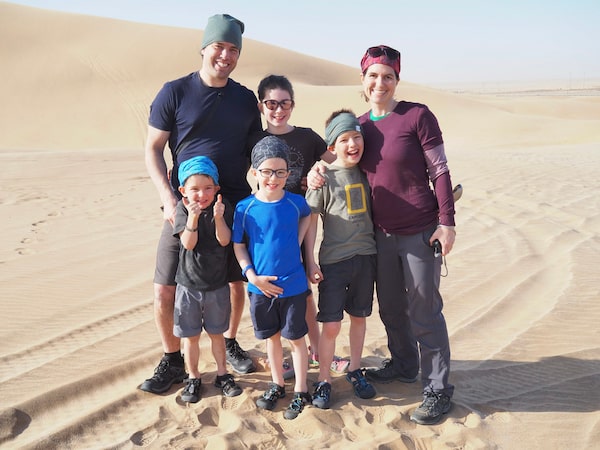
Edith Lemay, Sebastien Pelletier and their four kids on a sand dune near Walvis Bay, Namibia.Supplied
A Quebec couple’s quest to give their children as many visual memories as possible before a degenerative eye disease takes away the vision of three of their four kids has led the family on a year-long trip around the world.
But since leaving their home in Montreal six months ago, Edith Lemay and Sebastien Pelletier feel like people around the world have joined their journey. Their Instagram account documenting the trip has grown from 1,000 to more than 80,000 followers, and TV news stations in far-off countries such as the Philippines and the UAE have featured their adventures.
“I got so much love and people reaching out saying ‘Thank you for inspiring me’ or ‘I have the disease, and thank you for talking about it and inspiring me to do something,’” Ms. Lemay said in a phone interview from Bali.
The idea for a worldwide trip started when three of the couple’s children were diagnosed with an incurable disease that will eventually leave them blind. A specialist told the parents it would be a good idea to fill their children’s minds with visual memories before their eyesight disappeared.

The family on the Mediterranean coast in Turkey.Supplied
Ms. Lemay says the specialist meant they should show their kids lots of pictures of things like animals, for example, to reference in the future. But she decided to take the advice more literally.
“It clicked and I said ‘I’m not going to do it with a book, I’m going to see them for real,’” said Ms. Lemay. “I wanted to show them how beautiful the world was.”
After years of issues with her eyesight, their first-born, daughter Mia, was diagnosed six years ago with retinitis pigmentosa, a rare genetic condition. By 2019, two more of their children also got the diagnosis. The news came as a shock: The couple were unaware they had the genes that could lead to the condition, and there was only a one in four chance of their children developing it.
When the couple thought of doing a world tour, they asked their children what sights they would want to see. Seven-year-old Colin wanted to ride on an overnight train. Mia, 13, was enamored with horses. And five-year-old Laurent had the peculiar request of drinking juice while on a camel.

Riding camels in Mongolia.Supplied
The family is now six months, six countries and three continents deep into their journey. So far they have travelled through Namibia, Zambia, Tanzania, Turkey, Mongolia and now Indonesia.
They will travel for another six months, but have chosen not to plan too far in advance.
There have already been some organizational hiccups: They first decided to leave in 2020, but COVID-19 got in the way. The pandemic-related border shutdowns also nixed their plans to visit Japan, where their nine-year-old son Leo – the only one who has not developed the eye condition – wanted to go because of Pokémon.
Finding a ‘fur cure’ at a B.C. ranch resort more calming than anything the doctor ordered
Besides creating a rich visual travel experience for the kids, Ms. Lemay and Mr. Pelletier wanted to show them how fortunate they are despite their condition. They also wanted their kids to experience the challenges of third-world travel as a way to prepare them for the everyday obstacles that will come with being blind.
“With the disease, they’ll always have to adjust their whole life,” said Ms. Lemay. She said the vision loss will not be linear and it could take well into their adulthood until they go blind.
“They’ll be able to drive for a while, but then they’ll have to let it go. It’ll be constant falling and getting back on their feet all through their lives.”

In a cabin on an overnight train from Zambia to Tanzania, minus Edith who took the photo.Supplied
With that in mind, they chose to stay in guesthouses instead of hotels and sometimes took local modes of transport, such as an old, rickety Zambian bus without air conditioning, which featured bathroom breaks in wide open fields during one detour. In Mongolia, they stayed in yurts without running water.
Despite the challenges and occasional fights that come with being around each other 24/7, Ms. Lemay said the kids have loved the trip.
Watching their children take in the experiences of the trip has also helped Ms. Lemay and Mr. Pelletier see the world in a different way.
“You can take them to amazing sights like the biggest sand dune in the world, and then they’ll just turn around and look at little beetles because that’s what’s extraordinary to them,” said Ms. Lemay.
With another six months of travel to go, she said she hopes their trip will continue to inspire parents of children with life-altering conditions to make the most of their situation.
“It’s brought out the good heart of people,” she said.